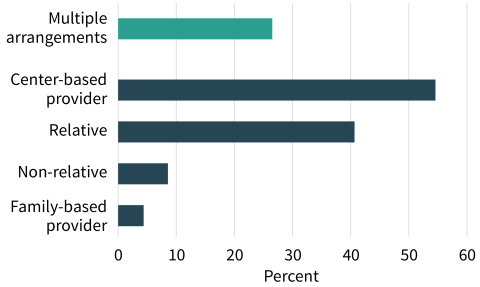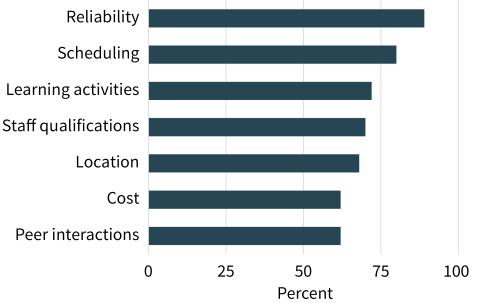download primer #1
Key Findings




The Carsey School of Public Policy’s Granite Guide to Early Childhood series highlights issues surrounding early care and education in New Hampshire by synthesizing evidence on a set of interconnected topics. This primer focuses on New Hampshire families’ “demand” for child care. For more detail about the series, including its other featured topics, visit this link.
Center-Based Care Is Most Common, but Less So Among Families with Infants or Lower Incomes
About 70 percent of New Hampshire households with a child under age five use some nonparental child care.1 At least 55 percent of households using care use a center-based arrangement—the most common arrangement (Figure 1). At least 41 percent use relatives some or all the time, while fewer than one-in-ten use non-relatives or family-based child care providers. Over one-quarter use multiple arrangements, suggesting that a single provider may not meet all family needs.
Statewide data are sparse on child care differences by family characteristics. However, data representing New England reveal that arrangements vary by child age: families with younger children use nonparental care less often, and when they do, it is more often provided by relatives and less often center-based.2 Data collected among working parents in New Hampshire and Vermont’s Upper Valley showed a similar pattern: half of respondents with infants used only licensed care, compared to two-thirds of those with preschoolers.
At least some New Hampshire parents prefer parental care only. However, others may not have a choice. For example, many New Hampshire providers don’t offer infant care, and when they do, tuition is higher than for other ages. In short, although some parents are satisfied with their child care, many make trade-offs and rely on arrangements misaligned with what they want or need.

Source. Author analysis of U.S. Census Bureau, Household Pulse Survey, Phases 3.6–3.8 (Weeks 49–57). Notes.3 Percentages reflect the lower bound of the 95 percent confidence interval (a conservative floor). Estimates are calculated among households with children under age 5 who used any care.
Reliability and Scheduling Are Parents’ Top Child Care Priorities
Few data sources describe New Hampshire families’ true child care preferences. However, regional data inform understanding of family preference in the Granite State. When parents in the Northeast rated the importance of different child care characteristics, reliability and scheduling topped the list (Figure 2).

Source. Author analysis of 2019 National Household Education Survey of Early Childhood Program Participation. Notes.4
New Hampshire-specific data consistently show the importance of scheduling. Despite varying approaches, three rounds of New Hampshire Preschool Development Grant (PDG) surveys found that among parents who struggled to find child care, between 30 and 33 percent struggled to match their work schedules. Scheduling is especially relevant for those working non-traditional hours: over one-quarter of Granite State children under age six have parents who work outside the nine-to-five workday, and over sixty percent of these children live with just one parent.
Although scheduling is key, families’ most common barriers to getting the child care they need are basic: finding and affording a spot. Respondents to the 2022 PDG survey indicated the biggest challenge in finding care was a lack of openings. Among the 80 percent who rated their current arrangement as less than ideal, the most common reason cited was unaffordability. Data specific to New Hampshire and Vermont Upper Valley workers concur, showing that more than half of respondents needed more child care than they had, most often citing affordability as the barrier. With child care prices rising in New Hampshire, constraints around cost—along with availability—continue to disrupt the connection between utilization and preference.
Complex Systemic Challenges Divert Families’ Preferences From Practices
Understanding New Hampshire families’ existing child care arrangements clarifies immediate demands on the state’s early childhood systems. Understanding families’ preferences, which reflect a mix of practical considerations like reliability, scheduling, and location, along with preference for certain settings and experiences, help frame the sector’s long-term goals. The gap between the two results from a web of complex problems. Child care providers operate on thin margins, at risk of unreliable offerings through abrupt closures, high turnover, or limited hours. Meeting New Hampshire families’ diverse needs with an array of accessible, affordable, flexible choices will require short- and long-term efforts to address systemic issues and bring families’ practices in line with their preferences.
About the Authors
- Rebecca Glauber is an associate professor of sociology at the University of New Hampshire.
- Jess Carson is the director of the Center for Social Policy in Practice and a research assistant professor at the University of New Hampshire’s Carsey School of Public Policy.
Acknowledgments
This project was supported by New Hampshire’s Preschool Development Grant, sponsored by the Administration for Children and Families (Award # 90TP0110). Additional project support was provided by the Couch Family Foundation.5
© 2024. University of New Hampshire. All rights reserved.
